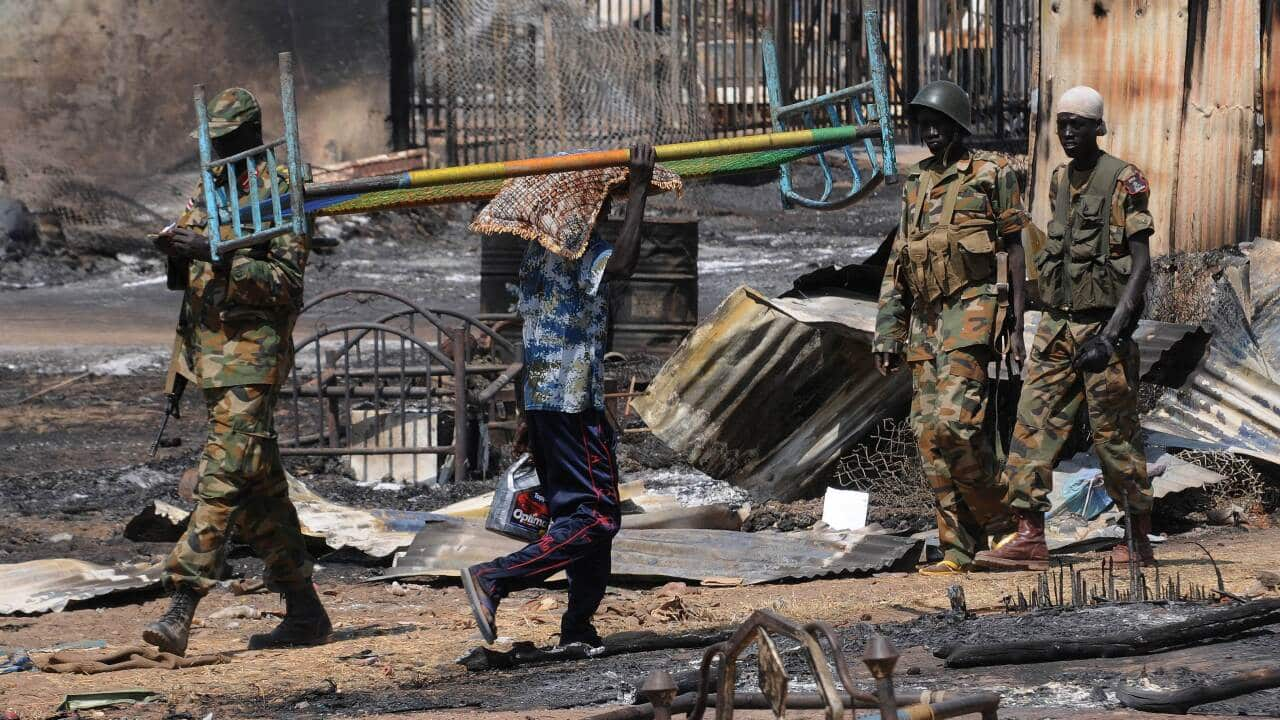There are fears the world's youngest nation, South Sudan, is on the brink of collapse after four months of civil war.
(Transcript from World News Radio)
It comes amid reports from the United Nations describing horrific scenes from what it says is a recent massacre in a South Sudanese town.
The latest outbreak of violence has highlighted how much the fighting has spiralled along ethnic lines.
(Click on audio tab to listen to this item)
A warning: This report contains graphic descriptions.
What started as a political power struggle last December is now raising the prospects of turning into a full-blown civil war.
Fighting between troops backing President Salva Kiir and soldiers loyal to his sacked vice president, Riek Machar, has spread from the capital Juba to other parts of the country.
Both sides stand accused of carrying out ethnic massacres since the fighting started.
In the latest incident, the United Nations says hundreds of civilians were killed in the massacre last week in the town of Bentiu.
The top UN humanitarian official in South Sudan, Toby Lanzer, visited the capital of the oil-producing Unity state shortly after the killings took place.
Mr Lanzer describes what he says were piles and piles of bodies left behind after the shootings.
He says a strong stench of decomposing filled the air, while vultures and dogs ate off the limbs, scalps and abdomens of dead bodies.
Mr Lanzer says he has seen remains of people who were executed, including people trying to seek shelter in a mosque.
"During the past few days, Bentiu was the scene of severe violence, very targeted deliberate violence that struck individuals of certain identities. And I think that what I've so far seen in the mosque and other parts of town has really been very, very heartwrenching. Certainly, atrocities have been committed here on a very significant scale."
The United Nations says more than 200 civilians were reportedly killed and over 400 wounded.
It says many of those killed were seeking refuge in the mosque, a hospital and a church.
The United Nations says the rebels entered the mosque, separated individuals of certain nationalities and ethnic groups and escorted them to safety, while the others were killed.
It says hate speech was broadcast on a local radio station, suggesting certain groups should leave the town and urging men to rape women.
UN spokesman Joseph Contreras says the violence appears to have been incited in part by calls on the radio for revenge attacks, including rapes.
"The UN mission in South Sudan strongly condemns the killing of civilians in Bentiu, Unity state, last week. Those killing were done on the basis of ethnic affiliation and nationalities. The UN mission in South Sudan also strongly condemns the use of Bentiu 99 FM radio station to broadcast hate massages directed at certain ethnic groups."
The government of South Sudan has also accused the rebels of massacring civilians.
But the rebels dismiss the allegations by both the United Nations and the government as baseless.
Rebel commander James Koang has accused part of the UN mission in South Sudan of pedalling what he says is cheap propaganda.
"No, I do not (have) this, I don't have that report. We did not kill those who were in the mosque. Who are those people? We don't know. We don't know. We did not enter the mosque."
The rebels seized the key town more than a week ago and immediately warned oil firms operating in government-held areas to pack up and leave within a week.
South Sudan gets about 90 per cent of its revenue from oil.
Foreign Minister Barnaba Benjamin says the latest violence has considerably slowed production, which had picked up after the first round of violence.
"The oilfields in Unity state, which produces about 40,000 barrels a day, those oilfields were even shut down just before the fight broke out in Unity state. That is the only part of the oil affected. But the rest of the oilfields ... of course, the reduction, the production, is not what it used to be, but it was producing adequate oil when the oil production resumed just before the trouble started again."
The United Nations has warned over a million people are at risk of famine, with some 5 million needing aid.
The U-N Children's Fund says children in the country are being traumatised on many levels.
UNICEF warns nearly a quarter of a million children are at risk of suffering from severe acute malnutrition by the end of the year.
It also says they are being separated from their parents and facing recruitment into armed groups by both government and opposition forces.
UNICEF spokesman Christophe Boulierac says children are paying the price for the continuing conflict.
"It's definitely a very dangerous situation. The children are among the first victims, which is unacceptable. On top of malnutrition, we have several problems of recruitment of children in armed groups. We have unverified reports which indicate that large numbers of children are being used by armed groups associated with opposition forces. We have a verified report which indicates that 149 children have been used by government forces since the current conflict began."
A January ceasefire signed in Ethiopia by both warring sides appears to be in tatters.
The latest round in slow-moving talks is due next Monday, with the United States and the European Union threatening possible sanctions.
Around 80,000 civilians are sheltering inside cramped UN bases across the country, fearing they will be attacked.
According to the United Nations, the conflict has displaced more than 1 million people and thousands have been killed since December.
Share

